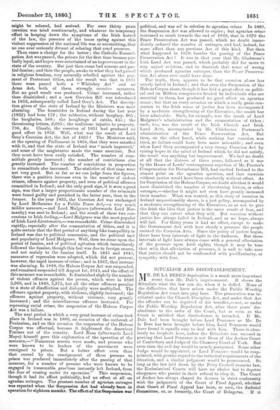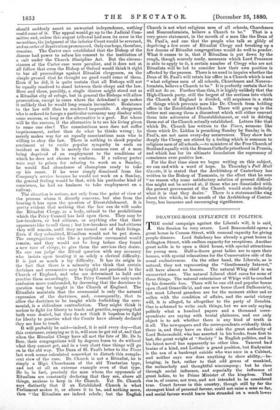RITUALISM AND DISESTABLISHMENT.
mR. DE LA BERE'S deprivation is a much more important 1 event than Mr. Dale's imprisonment. It shows the Ritualists what the law can do, when it is defied. None of the difficulties that have arisen under the Public Worship Regulation Act come into play here. The prosecution was in- stituted under the Church Discipline Act, and under that Act the offender can be deprived of his benefice,—not, as under the Public Worship Regulation Act, after three years' dis- obedience to the order Of the Court, but as soon as the Court is satisfied that disobedience is intended. If Mr. Dale had been brought before Lord Penzance as Mr. De la Bere has been brought before him, Lord Penzance would have found it equally easy to deal with him. There is abso- lutely no loophole here, unless the Ritualists can succeed in proving that Lord Penzance is not Dean of the Arches Court of Canterbury and Judge of the Chancery Court of York. But even then the evil day would be merely postponed. Some other Judge would be appointed, or Lord Penzance would be reap- pointed, with greater regard to the technical requirements of the situation, and a similar judgment would be pronounced. So long as the law laid down by the Privy Council remains law, the Ecclesiastical Courts will have no choice but to deprive clergymen who persist in their refusal to obey it. The Court of Arches has always shaped its decrees in strict conformity with the judgments of the Court of Final Appeal, whether that Goad of Final Appeal has been, as now, the Judicial Committee, or. as formerly, the Court of Delegates. If it
should suddenly assert an unwonted independence, nothing' could come of it. The appeal would go up to the Judicial Com- mittee and, unless this august tribunal had seen its error in the meantime, the judgment of the inferior Court would be reversed, and an order of deprivation pronounced. Only one hope, therefore, remains. The Carter case established that the Bishop of the diocese had power to refuse his consent to the institution of a suit under the Church Discipline Act. But the circum- stances of the Carter case were peculiar, and it does not at all follow that even the Bishop of Oxford would think it right to bar all proceedings against Ritualist clergymen, on the simple ground that he thought no good could come of them. Even if he did, it is quite certain that all Bishops will not be equally resolved to stand between their clergy and the law. Here and there, possibly, a single diocese might stand out as a Ritualist city of refuge, but in general the Bishops will allow prosecution, except in cases where the defendant's age makes it unlikely that he would long remain incumbent. Resistance to the law will then be rendered impossible. A clergyman who is ordered to forego a particular ceremony may disobey with some success, so long as the alternative is a gaol. But where will be the success, if the alternative is to see his living given to some one else ? The conscientious man does not suffer imprisonment, rather than do what he thinks wrong ; he merely makes way for an equally conscientious man who is willing to obey the law. There is nothing to shock popular sentiment or to excite popular sympathy in such an incident as this. It is merely the common case of a man being deprived of an employment to the conditions of which he does not choose to conform. If a railway porter were sent to prison for refusing to work on a Sunday, he would find abundance of champ;ons ready to take up his cause. If he were simply dismissed from the Company's service because he would not work on a Sunday, the general feeling would be that, with his particular kind of conscience, he had no business to take employment on a railway.
The situation is serious, not only from the point of view of the persons whom it directly concerns, but also from the bearing it has upon the question of Disestablishtuent. It is pretty evident that nothing that the law can do will make the Ritualist Clergy, as a body, submit to the prohibitions which the Privy Council has laid upon them. They may be law-breakers, or bad citizens, or anything else that their opponents like to call them ; but law-breakers and bad citizens they will remain, until they are turned out of their livings. Even if they submitted, Ritualism would not be put down. The congregations who like a particular ceremonial would remain, and they would not be long before they found a new race of clergy, to give them the services they desire. No one can judge the Ritual question with any accuracy who insists upon treating it as solely a clerical difficulty. It is just as much a lay difficulty. It has its origin in the fact that there is a minority who think that certain doctrines and ceremonies may be taught and practised in the Church of England, and who are determined to hold and practise them accordingly. The Privy Council has only made confusion more confounded, by decreeing that the doctrines in question may be taught in the Church of England. The Ritualists maintain that the ceremonial is only the natural expression of the doctrines, and, consequently, that to allow the doctrines to be taught while forbidding the cere- monial, is a ridiculous contradiction. They might think it useless to fight for liberty to teach and practise, supposing that both were denied, but they do not think it hopeless to fight for liberty to practise what the Courts have already declared they are free to teach.
It will probably be said—indeed, it is said every day—that this resistance, annoying as it is, will soon be got rid of, and that when the Ritualist Clergy have all met the fate of Mr. De la Bere, their congregations will by degrees learn to do without what they cannot get, and in a very short time things will go on in the old way. The Dean of St. Paul's letter to the Times last week seems calculated somewhat to disturb this compla- cent view of the case. Dr. Church is not a Ritualist, he is simply a High Churchman of the old Tractarian type, and not at all an extreme example even of that type. He is, in fact, precisely the man whom the opponents of Ritualism are constantly declaring that they are, above all things, anxious to keep in the Church. Yet Dr. Church says distinctly that if an Established Church is what Parliament makes it, or allows it to be, and nothing more, then "the Ritualists are indeed rebels ; but the English Church is not what religious men of all schools, Churchmen and Nonconformists, believe a Church to be." That is a
very grave statement, in the mouth of a man like the Dean of St. Paul's, and one that the people who talk so glibly of
depriving a few score of Ritualist Clergy and breaking up a few dozens of Ritualist congregations would do well to ponder. What it comes to is, that if Ritualism is put down by the rough, though scarcely ready, measures which Lord Penzance is able to apply to it, a certain number of Clergy who are not Ritualists will be led to consider how their own position is affected by the process. There is no need to inquire whether the Dean of St. Paul's will retain his office in a Church which is not "what religions men of all schools, Churchmen and Noncon- formists, believe a Church to be." It is perfectly certain that he will not do so. Further than this, it is highly unlikely that the High-Church party, still the largest of the sections into which the Church of England is divided, will acquiesce in a state of things which prevents men like Dr. Church from holding office in the Established Church. There will grow up in the better sort among them a discontent which will either convert them into advocates of Disestablishment, or end in driving them out of the Church actually established. Letters like that which Dr. Church has written to the Times, sermons like those which Dr. Liddon is preaching Sunday by Sunday in St. Paul's, are not mere every-day occurrences. They show how deeply the Clergy are stirred by a feeling which is common to religious men of all schools,—to ministers of the Free Church of Scotland equally with the Roman Catholic priesthood in Prussia, and which has for its ultimate foundation the supremacy of conscience over positive law.
For the first time since we began writing on this subject, we can end with a word of hope. In Thursday's Pall Hall Gazette, it is stated that the Archbishop of Canterbury has written to the Bishop of Tasmania, to the effect that he sees "no reason why some satisfactory solution of present difficul- ties might not be arrived at, if those who are dissatisfied with the present government of the Church would state definitely what it is that they desire." There is a statesmanlike ring about this which, in the mouth of the Archbishop of Canter- bury, has immense and encouraging significance.



































 Previous page
Previous page